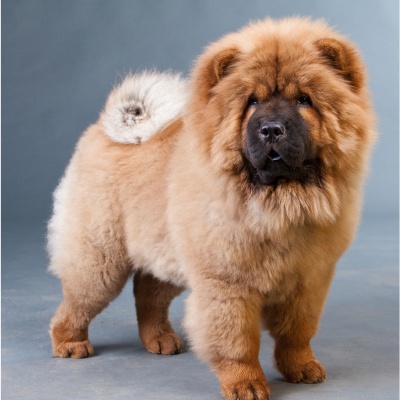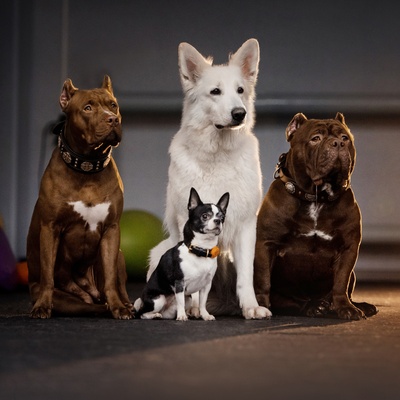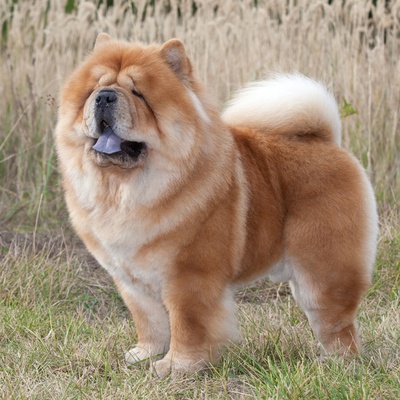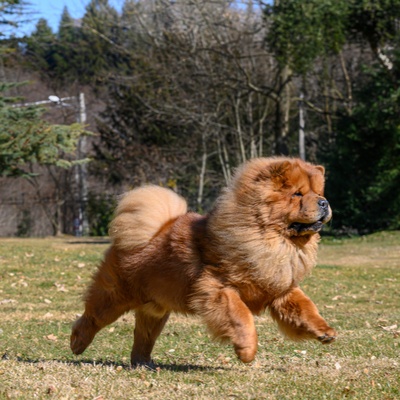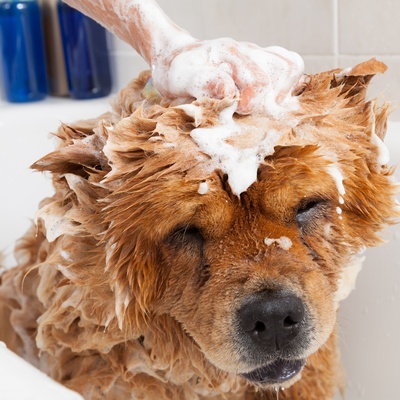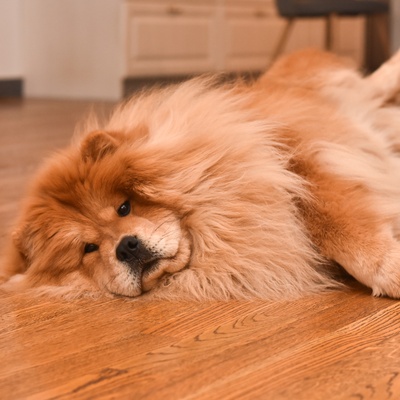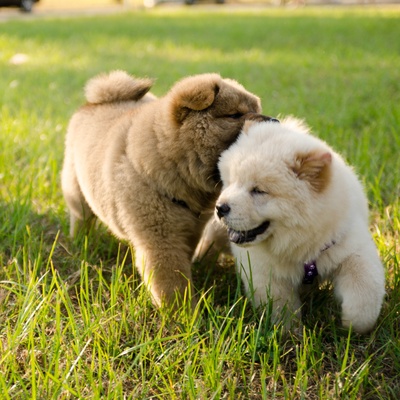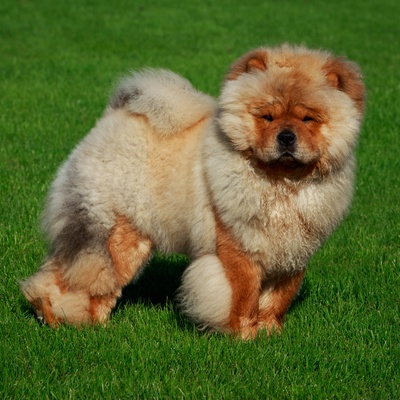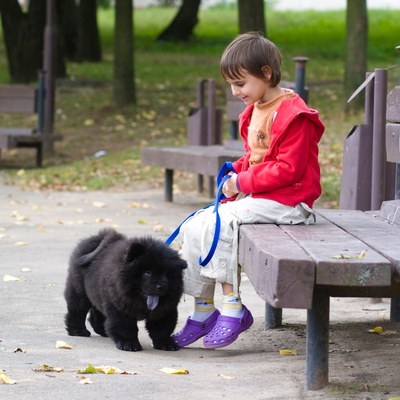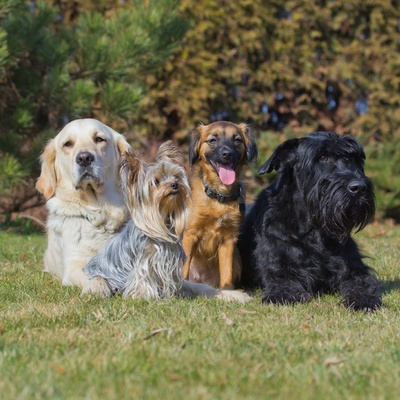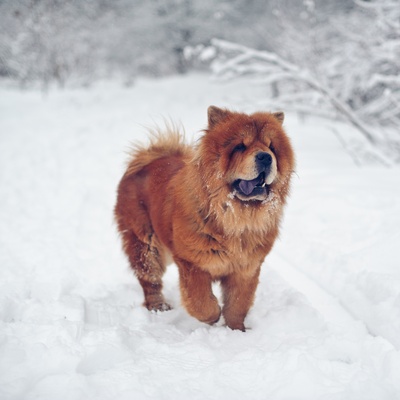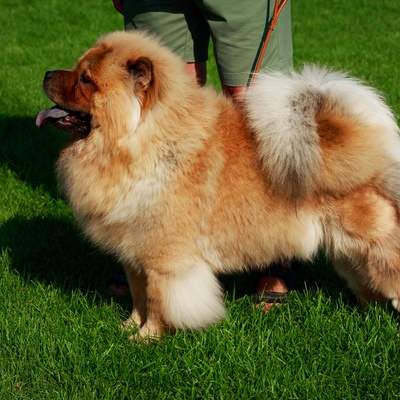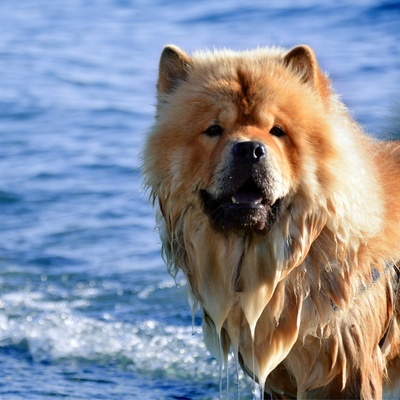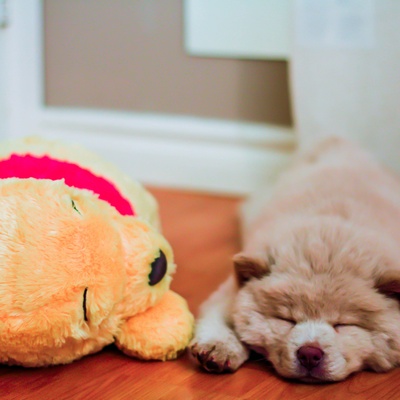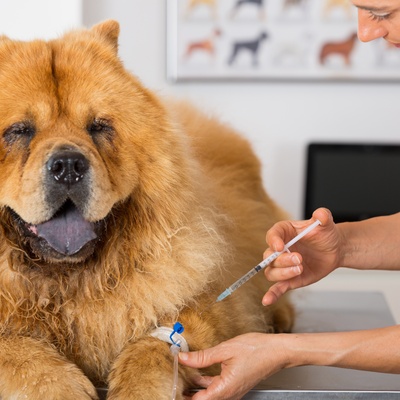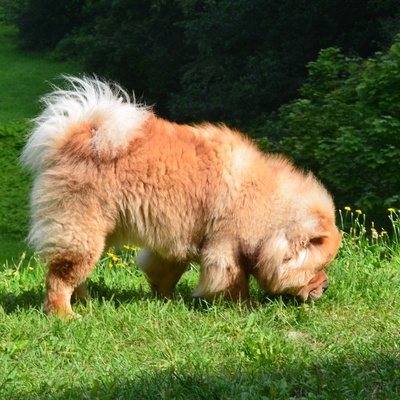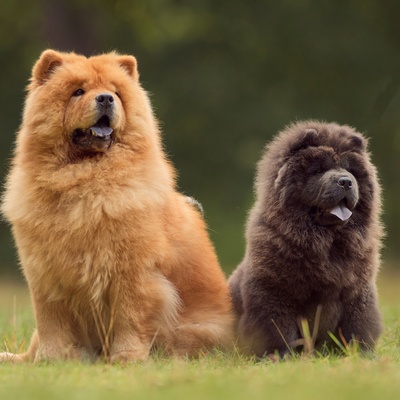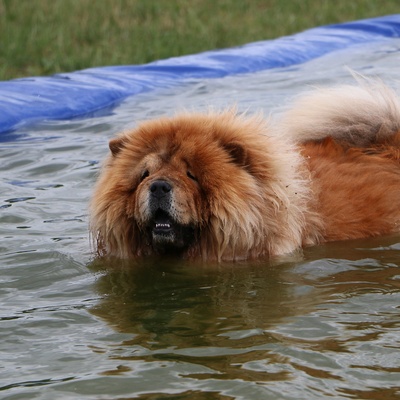Introducing the Chow Chow
Discover all there is to know about the Chow Chow : its characteristics, behavior, training, and its cost.
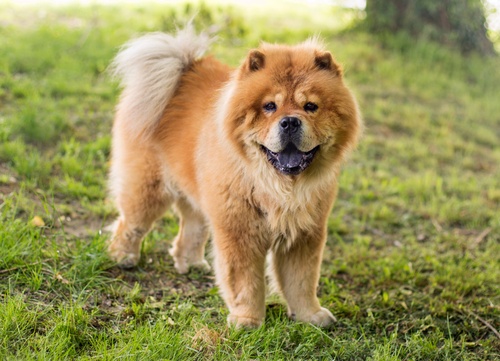
Discover all there is to know about the Chow Chow : its characteristics, behavior, training, and its cost.
The Chow Chow breed holds a special place in the canine world, thanks to its unique characteristics and rich history. Originating from China, the Chow Chow is known for its lion-like mane and distinctive blue-black tongue, features that contribute to its noble and somewhat aloof appearance. This breed is among the most visually striking and has a strong presence that captivates dog lovers worldwide.
Despite their regal demeanor, Chow Chows are known for their loyalty and affection towards their family members. Their versatility is evident in their adaptability to various roles, from being a devoted companion to serving as a dignified watchdog. The Chow Chow's unique combination of elegance, loyalty, and mystery makes it a fascinating subject for anyone interested in exploring the diversity of the dog world.
This section provides a detailed overview of the unique characteristics of the Chow Chow breed.
The Chow Chow belongs to the Non-Sporting group (5). Chow Chows are known for their dignified and independent temperament, making them a fascinating member of this group.
Chow Chows are medium to large dogs, generally standing between 17 to 20 inches at the shoulder and weighing between 45 to 70 pounds.
The breed features a dense double coat that can either be smooth or rough. The thick fur is particularly plush around the neck, giving the Chow Chow its characteristic mane or ruff.
Chow Chows' coats come in several colors, including red, black, blue, cinnamon, and cream. These colors can range from light to dark shades, providing a variety of stunning looks within the breed.
Chow Chows are adaptable to various living environments but thrive best in homes where they can have a bit of space to roam. They are well-suited to cooler climates thanks to their thick coats.
While known for their aloofness, Chow Chows can be affectionate and loyal to their families. They tend to be reserved around strangers and may not be the best fit for households with small children.
Generally, Chow Chows are a healthy breed but can be predisposed to certain conditions like hip dysplasia, entropion, and allergies.
Chow Chows possess a noble and somewhat stubborn temperament, making them a challenge to train for inexperienced owners. Early socialization and obedience training are crucial to developing a well-mannered Chow Chow.
We can help!
Every dog has its own character, and so do you. Making the right choice will ensure his well-being and yours.
Take our quiz to find out which breed is right for you, based on your personality, lifestyle, location and many other criteria.
Don't wait any longer and take the quiz to find out the answer!
Chow Chows are medium-sized dogs known for their majestic, lion-like appearance, emphasized by their dense double coat and distinctive ruff around the neck. With a deep-set almond-shaped eyes and a unique blue-black tongue, their dignified face is truly one of a kind.
Chow Chows exhibit a compact frame with females typically standing between 17 and 20 inches, and males slightly larger at 18 to 22 inches. In terms of weight, females usually range from 45 to 60 pounds, while males can weigh between 55 and 70 pounds.
This breed experiences a steady growth, reaching a significant portion of their adult size and weight by the age of one year. Full maturity and their ultimate size are typically achieved by the age of two, showcasing a balanced growth rate that complements their sturdy and balanced physique.
The Chow Chow boasts a magnificent double coat that can be either rough or smooth. The rough coat is characterized by a profuse, dense, and straight outer layer with a soft, woolly undercoat, creating its iconic lion-like ruff around the neck.
The Chow Chow's coat presents a beautiful spectrum of colors, including red, black, blue, cinnamon, and cream. These colors can range from light to deep shades, making each Chow Chow uniquely stunning.
Chow Chows require regular grooming to maintain their splendid coat and overall health. Due to their thick undercoat, they shed moderately throughout the year, with seasonal peaks in spring and autumn when they shed more heavily. Brushing several times a week is essential to remove dead hair and prevent matting, especially for the rough-coated variety.
Bathing should be done every few months or as needed, taking care not to strip their coat of natural oils. Proper grooming not only keeps the Chow Chow looking its best but also provides an opportunity to check for skin issues or parasites.
The Chow Chow presents a strikingly balanced and well-proportioned figure, easily recognizable by its unique physical attributes. The breed's head is broad and flat with a well-defined stop and a muzzle that is strong but not pointed, giving it a distinctive profile. Their eyes, small and deep-set, are almond-shaped and dark in color, contributing to their inscrutable expression. The ears are small, thick, slightly rounded at the tips, and set wide apart, erect and forward over the eyes, enhancing their alert demeanor.
The body of the Chow Chow is compact, with a straight back, well-rounded chest, and a lion-like mane around the neck which adds to their imposing appearance. The muscular build beneath their thick coat is more implied than visible, giving them a sturdy and robust stance.
The Chow Chow is known for its dignified and aloof temperament, yet they are intensely loyal and protective of their family, showing affection in their unique, reserved manner.
With over 400 dog breeds categorized into 10 groups based on similar functions or characteristics, the Chow Chow is part of the Non-Sporting group (5). This diverse category encompasses dogs that don't fit into working, herding, or sporting groups, including breeds like the Dalmatian or Bulldog. Non-Sporting dogs are known for their unique looks and friendly nature, rather than specific work roles.
The Chow Chow is noted for its ancient heritage, distinctive blue-black tongue, and lion-like mane, valued for its protective nature, independence, and calm temperament. Although not the most outwardly affectionate, it is immensely loyal to its family, serving as a loyal companion and guardian.
The Chow Chow, with its regal and lion-like appearance, carries an aura of aloofness and independence that is unique to the breed. Known for their dignified demeanor, Chow Chows do not demand constant attention, but they form strong, loyal bonds with their owners. They show their affection in a reserved manner, preferring quiet companionship to overt displays of enthusiasm.
The presence of an attentive and understanding owner is crucial for the Chow Chow, as it helps them develop a well-rounded temperament. Owners should respect their need for space while also ensuring they are part of daily activities, as Chow Chows thrive on being included in the family unit without being the center of attention.
Chow Chows are independent yet affectionate with family, showing aloofness without unfriendliness. Their interaction with strangers and children is cautious, requiring supervision with young kids to respect the dog's personal space. Early socialization is key, enhancing their sociability towards others and ensuring a well-adjusted, confident adult dog capable of graceful social navigation.
Take the test and find out the dog breed that matches your personality and lifestyle.
The Chow Chow surprisingly adapts well to a variety of living situations, but to support their well-being, Chow Chows require regular mental stimulation and physical exercise. Daily walks are essential, with a recommended duration of at least 30 to 45 minutes, to ensure they remain healthy and balanced.
Chow Chows excel in environments that allow for exploration, requiring secure outdoor areas like gardens or parks for leisurely walks and observation. Such spaces support their need for autonomy and exercise at their own pace, under the owner's supervision. Recognizing the breed's preference for calm and controlled energy outlets is key for potential owners, as it contributes to the dogs' well-being and mitigates aloofness, fostering more sociable behavior.
The Chow Chow is a breed marked by its superior intelligence and an innate sense of dignity, making them intriguing yet somewhat challenging companions to train. Their intelligence means they can quickly grasp new commands and routines; however, their independent nature often requires a more nuanced approach to training. The key is to engage them with respect and patience, emphasizing positive reinforcement techniques that reward good behavior.
It's important to establish leadership and mutual respect from the outset, as Chow Chows respond well to confident and consistent guidance. Equipping a Chow Chow with a GPS collar is a wise precaution for owners. Given their independent streak, a GPS collar can provide peace of mind by ensuring that, should they wander or become distracted by their surroundings during outdoor adventures, they can be easily located and safely returned home.
Training Chow Chows requires a calm, assertive approach, understanding their unique traits and starting early with socialization. They need consistent, engaging training to capture their interest, as they're not naturally eager to please.
Effective training combines firmness, fairness, and variety to overcome their stubbornness, focusing on building a strong bond and respecting their independence. A well-trained Chow Chow, with safety measures like a GPS collar, becomes a confident, loyal family member.
While generally healthy, this breed requires attentive care to prevent common health issues and ensure a long, fulfilling life. Daily care routines play a crucial role in preserving the health of a Chow Chow, effectively preventing diseases and infections that can affect this unique breed.
Chow Chows are robust dogs with a good overall health profile, yet like any breed, they have predispositions to certain health conditions. Specific concerns include hip and elbow dysplasia, entropion (a condition where the eyelid folds inward), and certain skin and coat issues due to their dense fur. Additionally, they can be prone to thyroid function and autoimmune diseases.
Symptoms of these conditions vary but often involve lameness or difficulty moving, eye irritation, or unusual skin conditions. The typical lifespan of a Chow Chow ranges between 8 to 12 years, depending on their health, lifestyle, and the care they receive.
To ensure the well-being of your Chow Chow, regular veterinary care is essential throughout their life. This includes vaccinations, deworming, and treatments for fleas and ticks as recommended by a veterinarian. Daily care routines are equally important and should include thorough brushing of their dense coat several times a week to prevent matting and skin issues. Regular cleaning of their ears is crucial to prevent infections, particularly given their susceptibility. Dental care, through brushing or dental treats, and routine nail trimming, are also vital to their overall health.
While Chow Chows are not classified as a hypoallergenic breed, owners should be mindful of potential allergies, both environmental and dietary, and consult with a vet for management strategies.
Maintaining a Chow Chow's health requires a balanced diet tailored to their needs, emphasizing proteins and essential vitamins to support their muscular build and dense coat. High-quality kibble meets their nutritional needs, while lean meats can supplement higher protein requirements.
It's crucial to manage fat content to avoid weight issues. Mindful portion control and quality food contribute to their well-being. Despite their less visible enthusiasm for food, consistent feeding routines and a diet meeting their nutritional needs are vital for their health and satisfaction.
The Chow Chow is highly regarded for its distinctive lion-like appearance and noble demeanor, making it a sought-after breed. It's important to consider several factors before adopting, including the breed's specific needs and the commitment required to ensure their well-being.
Before bringing a Chow Chow into your home, it's crucial to make an informed decision. Choosing a reputable breeder is paramount. Visiting the breeder's premises allows prospective owners to observe the living conditions, behavior of the dogs, and to gauge the breeder's knowledge and commitment to the breed's health and well-being. It's essential to inquire about the health of the puppy and its parents, seeking transparent information regarding any hereditary illnesses.
Finally, while electronic identification methods such as microchipped are not universally required by federal law in the United States for dogs, microchipping is widely recognized as an effective means of permanently identifying pets. This significantly enhances the chances of reuniting lost pets with their owners, even without nationwide regulatory requirements.
The cost of acquiring a Chow Chow puppy can vary significantly, influenced by factors such as the dog's lineage, pedigree, the breeder's reputation, and the puppy's age. Generally, prices for Chow Chow puppies range from
to
, depending on these variables.
Beyond the initial purchase price, owning a Chow Chow involves ongoing expenses for their care, including food, veterinary visits, grooming, and insurance. The estimated annual cost for maintaining a Chow Chow can range from
to
.
This estimate can vary based on the dog's health, the quality of care provided, and unforeseen expenses such as emergency medical treatment. Prospective owners should consider these financial commitments when deciding to bring a Chow Chow into their lives.
Choosing a dog that matches your personality and lifestyle will ensure your well-being and his!
To access the most relevant information, suitable payment methods, and delivery in your region, please select the website corresponding to your country.
